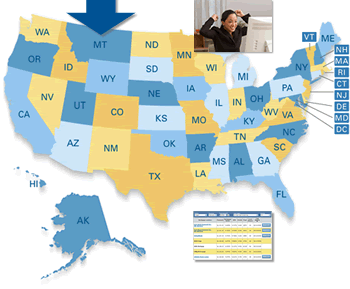Refinance > Refinancing Series of Articles
Refinance
Just One Click! = Current Mortgage Rate Chart

Start by selecting your state
2.2 Million Refinanced Mortgages Saving Homes, Economy
by Broderick Perkins
If you haven't looked into refinancing your mortgage under federal programs, you could be missing an opportunity to save money, keep your home and give the economy a little juice.
Federal mortgage refinance programs have given more than 2 million homeowners a better shot at holding on and the economy a much needed shot in the arm.
What's more, fixed interest rates are down and were recently listed as low as 4.75 percent for 30-year conforming mortgages, according to Erate.com
First American CoreLogic's "How the U.S. Consumer Has Benefited from Mortgage Finance Programs in 2009," reveals a group of 2.2 million homeowners have saved an average $120 a month on their mortgage payment -- a 10.5 percent reduction from the previous mortgage payment.
The study says the refinance activity will result in $2.3 billion in mortgage payment savings for borrowers who refinanced in the first six months of 2009. Over the next five years, the total benefit to homeowners who refinanced in 2009 will grow to $11.5 billion.
The study analyzed residential mortgage refinances that occurred between October 2008 and June 2009 to test the impact of Federal Reserve efforts to lower interest rates and to measure effect of the Making Home Affordable's Home Affordable Refinance Program (HARP).
This summer, HARP gave a hand up to more homeowners suffering mortgages larger than the value of their home.
Borrowers current on payments with Fannie Mae or Freddie Mac guaranteed loans could be eligible for refinancing into new loans even if they owe as much as 125 percent of the home's current value. The previous HARP loan-to-value limit was 105 percent.
Also, if the existing mortgage was written without mortgage insurance, the new loan won't be burdened with the extra cost. Fannie Mae and Freddie Mac loans typically require mortgage insurance when the loan is more than 80 percent of the home's value.
Of course, if the current mortgage has mortgage insurance and the new loan is 80 percent or more of the home's value, mortgage insurance comes with the deal.
The new 125 percent limit also may not apply if a second mortgage combined with the first exceeds the limit. The new deal also doesn't allow homeowners to take cash out.
Just One Click! = Current Mortgage Rate Chart

Start by selecting your state
Another plus from the program: The higher loan-to-value ratios were first available only to qualified borrowers who applied through their existing servicer.
That's changed.
Since Oct. 1, 2009, homeowners got the option to shop around and refinance through any Fannie or Freddie lender.
In addition to lowering your monthly payment, a refinanced mortgage can move you to a fixed or adjustable rate, shorten the term of your home loan, or let you tap home equity -- with a lender's approval.
"The quantitative easing policies of the Federal Reserve and refinance activity made possible by the Home Affordable Refinance Program (HARP) have allowed more than 2 million consumers to reduce their monthly mortgage debt obligations and put more money in their pockets," said study author, Mark Fleming, Ph.D. and First American's chief economist.
"This permanent increase in monthly income is likely to, in part, be used to increase consumption and help to drive growth as the economy rebounds. The combination of lower payments and fixed-rate terms should also reduce the risk of future foreclosure," he added.
To check your eligibility for a refinance under the new provision, go to Making Home Affordable.
To compare rates, costs and other factors by state, go to Erate.com.
Just One Click! = Current Mortgage Rate Chart

Start by selecting your state
Related Article: Refinancing: Four Mistakes to Avoid
Related Article: Refinancing: Know the Process, and the Closing Costs
Related Article: Refinancing: Three Common Types of Refinancings

